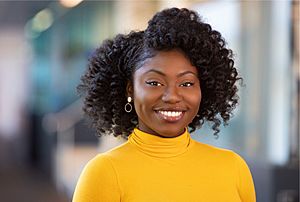Esther Odekunle facts for kids
Quick facts for kids
Esther A. Odekunle
|
|
|---|---|
 |
|
| Education | B.S., Biochemistry Ph.D., Neurobiology |
| Alma mater | Queen Mary University of London |
| Known for | Science communication |
| Scientific career | |
| Fields | Neuroscience Molecular biology Pharmacology |
| Institutions | GlaxoSmithKline |
| Thesis | Discovery and Characterisation of Vasopressin/Oxytocin-type Signalling in an Echinoderm and a Xenacoelomorph (2018) |
Esther A. Odekunle is a British scientist. She is a neurobiologist, which means she studies the brain and nervous system. She is also an antibody engineer. This means she works with special proteins called antibodies. Her research helps make sure these antibodies are safe to use as medicines. She also works to show how important it is to have people from all backgrounds in science, technology, engineering, and math (STEM).
Contents
Early Life and Education
Esther Odekunle grew up in the United Kingdom. She was the youngest of her siblings. Her parents were from Nigeria and had moved to the UK.
Discovering a Love for Science
When she was young, her teachers inspired her. Books about animals and the human body also made her curious. This helped her become interested in science early on. She first thought about becoming a doctor.
University Studies
Esther went to Queen Mary University of London. There, she earned two degrees. First, she got a Bachelor of Science (B.S.) in biochemistry. This field studies the chemistry of living things. Later, she earned a Ph.D. in neurobiology.
Research on Starfish
For her Ph.D. work, she studied neuropeptide systems in starfish. She chose starfish because they have amazing abilities. For example, they can regrow lost body parts. She had worked with mice and rats before. She also liked that starfish do not bite! She took a year off between her degrees. She received full funding for her Ph.D. from the Society for Experimental Biology.
Career
Esther Odekunle did not want to stay in university as a professor. Her goal was to learn a lot about one science area. She wanted to use her skills to create new treatments.
Antibody Engineering
As an antibody engineer, she works to create antibodies. These antibodies come from special cells called B cells. She helps develop them into possible treatments. These treatments can fight diseases like cancers, viral infections, and bacterial infections.
Speaking Out for Diversity
Scientists in the pharmaceutical industry cannot always talk about their work. This is because some information is private. So, Esther found other ways to share her voice in science. She started speaking out about racism in science and universities. She also helps encourage and highlight scientists who are not often seen. She does this on social media. For example, she made a YouTube video about Henrietta Lacks. This video has been shared with students of all ages.
Awards and Recognition
In 2021, Esther Odekunle was recognized for her work. She was a Rising Star Finalist. This was in the Black British Business Awards. She was honored in the STEM category.

